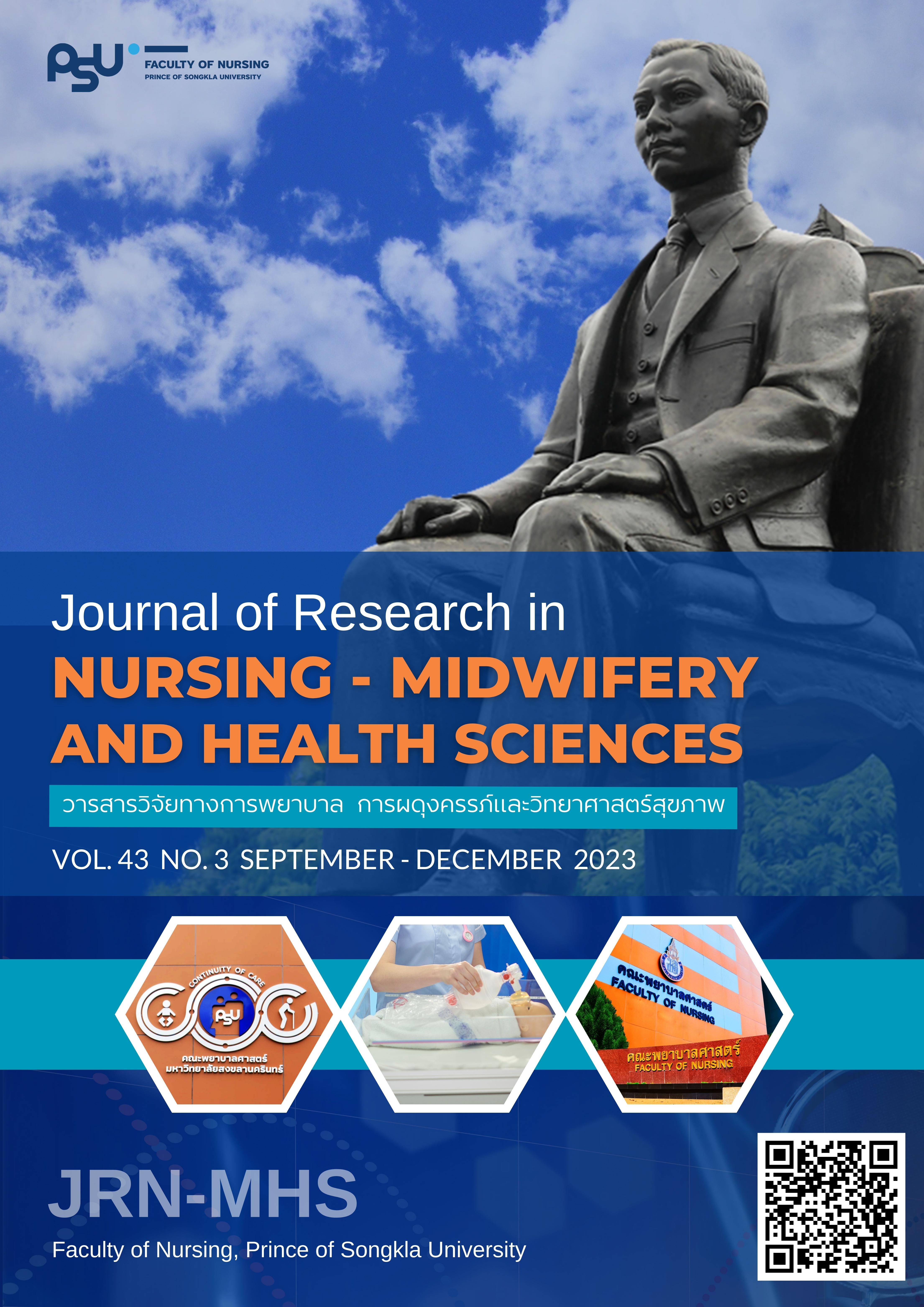ความคิดเห็นเกี่ยวกับความรู้ ความเชื่อ และสิทธิในการใช้ยาเม็ดคุมกำเนิดฉุกเฉินของวัยรุ่นในอำเภอแห่งหนึ่งของภาคใต้ตอนล่างของประเทศไทย
Main Article Content
บทคัดย่อ
วัตถุประสงค์: เพื่อศึกษาความคิดเห็นเกี่ยวกับความรู้ ความเชื่อ และสิทธิในการใช้ยาเม็ดคุมกำเนิดฉุกเฉินของวัยรุ่นวิธีการ: การวิจัยเชิงสำรวจในวัยรุ่นอายุ 12-19 ปี ที่ศึกษาในโรงเรียน วิทยาลัย หรือมหาวิทยาลัยในอำเภอแห่งหนึ่่งของภาคใต้ตอนล่างของประเทศไทย จำนวน 400 คน เลือกกลุ่มตัวอย่างแบบแบ่งชั้น เก็บข้อมูลโดยใช้แบบสอบถามความคิดเห็นเกี่ยวกับความรู้ ความเชื่อ และสิทธิในการใช้ยาเม็ดคุมกำเนิดฉุกเฉินของวัยรุ่น วิเคราะห์ข้อมูลโดยแจกแจงความถี่ ร้อยละ ค่าเฉลี่ย และส่วนเบี่ยงเบนมาตรฐาน ผลการศึกษา: ความคิดเห็นเกี่ยวกับความรู้ ความเชื่อและสิทธิในการใช้ยาเม็ดคุมกำเนิดฉุกเฉินของวัยรุ่น ประกอบด้วย 1) ความคิดเห็นเกี่ยวกับความรู้ วัยรุ่นเห็นด้วยว่าตนเองควรมีความรู้ (ร้อยละ 88) และควรรู้วิธีใช้ยาเม็ดคุมกำเนิดฉุกเฉินอย่างถูกต้อง (ร้อยละ 85.25) ซึ่งวัยรุ่นต้องการขอคำปรึกษาจากบิดามารดา (ร้อยละ 80.50) แต่คิดว่าบิดามารดาไม่มีความรู้ (ร้อยละ 45.75) 2) ด้านความเชื่อ วัยรุ่นเห็นด้วยกับการใช้ยาเม็ดคุมกำเนิดฉุกเฉินเป็นเรื่องปกติ (ร้อยละ 62) แต่ไม่กล้าไปซื้อด้วยตนเอง (ร้อยละ 76.50) คิดว่าการเข้าถึงยาเม็ดคุมกำเนิดฉุกเฉินได้ง่ายเป็นสาเหตุให้วัยรุ่นมีเพศสัมพันธ์ที่ไม่ป้องกันถี่ขึ้น (ร้อยละ 71.75) และหากวัยรุ่นมีความรู้จะไม่กล้าใช้ยาเม็ดคุมกำเนิดฉุกเฉินบ่อย ๆ (ร้อยละ 71.25) 3) ด้านสิทธิในการใช้ยาเม็ดคุมกำเนิดฉุกเฉิน วัยรุ่นเห็นด้วยว่าวัยรุ่นหญิงควรมีสิทธิในการตัดสินใจที่จะใช้หรือไม่ใช้ยาเม็ดคุมกำเนิดฉุกเฉิน (ร้อยละ 77.50) ควรมียาเม็ดคุมกำเนิดฉุกเฉินติดตัวไว้เพื่อป้องกันการตั้งครรภ์ไม่พึงประสงค์ (ร้อยละ 77.50) และควรได้รับยาเม็ดคุมกำเนิดฉุกเฉินเพื่อป้องกันการตั้งครรภ์เมื่อมีเพศสัมพันธ์ที่ไม่เต็มใจ (ร้อยละ 84.50) สรุป: ผลการวิจัยสามารถใช้เป็นข้อมูลสำหรับผู้ให้บริการด้านสาธารณสุขในการจัดการบริการเกี่ยวกับยาเม็ดคุมกำเนิดฉุกเฉินที่เหมาะสมกับวัยรุ่น
Article Details

อนุญาตภายใต้เงื่อนไข Creative Commons Attribution-NonCommercial-NoDerivatives 4.0 International License.
เอกสารอ้างอิง
World Health Organization. Adolescent pregnancy [Internet]. Geneva: World Health Organization; 2023 [cited 2023 May 16]. Available from: https://www.who.int/news-room/fact-sheets/detail/adolescent-pregnancy
World Health Organization. Early childbearing [Internet]. Geneva: World Health Organization; 2022 [cited 2023 May 16]. Available from: https://data.unicef.org/topic/child-health/adolescent-health/
Bureau of Reproductive Health, Department of Health. Situation of reproductive health in adolescents and young people 2021 [Internet]. Nonthaburi: Bureau of Reproductive Health; 2021 [cited 2023 May 16]. Available from: https://rh.anamai.moph.go.th/th/cms-of-1/211184
Bureau of Reproductive Health, Department of Health. Abortion surveillance report, Thailand 2020 [Internet]. Nonthaburi: Bureau of Reproductive Health; 2020 [cited 2023 May 16]. Available from: https://rh.anamai.moph.go.th/th/surveillance-report/3041#wow-book/
Chearnthong P, Saibubpa S. Contraception among teenage pregnancy in Health Region 1. JHEALTH. 2019; 9(2): 52-66. Thai.
Bureau of Reproductive Health, Department of Health. Teenage pregnancy surveillance report, Thailand 2021 [Internet]. Nonthaburi: Bureau of Reproductive Health; 2021 [cited 2023 May 16]. Available from: https://rh.anamai.moph.go.th/th/surveillance-report/3331#wow-book/
Tipwareerom W, Hanrungcharotorn U, Tongsen A. The attitudes towards barriers of condom use and errors among high school boy students. Nursing J. 2020; 47(4): 242-51. Thai.
Pojanapotha P, Singhakant S, Kaewpornsawan T, et al. Attitudes and sex education associated with sexual behavior in Thai male students in Bangkok. J Public Health. 2017; 47(1): 18-30. Thai.
Sunvijit S, Borerisuit W, Phranak N, et al. Development of the risk assessment model for adolescent pregnancy, Banthaen District, Chaiyaphum Province. Chaiyaphum Medical J. 2017; 37(3): 25-34. Thai.
Hfocus. Birth with poor quality, social problems waiting to be solved [Internet]. 2019 [cited 2023 May 16]. Available from: https://www.hfocus.org/content/2019/09/17826
Upadhya KK. Emergency contraception. Pediatrics. 2019; 144(6): e20193149. doi: 10.1542/peds.2019-3149.
Sangsawang N, Sangsawang B, Wisarapun P. Emergency contraception in adolescences. J Med Health Sci. 2016; 45-54. Thai.
World Health Organization. Emergency contraception [Internet]. Geneva: World Health Organization; 2021 [cited 2023 May 16]. Available from: https://www.who.int/newsroom/fact-sheets/detail/emergency-contraception
Wisarapun N, Sangsawang N, Sangsawang B. Comparison of knowledge, attitudes, awareness and characteristics of emergency contraceptive pill use in male adolescents. Journal of Nursing and Health Care. 2019; 37(1): 185-94. Thai.
Hualthanom M, Thongnopakun S. Factors related to emergency contraceptive pill use based on the informationmotivation-behavioral skills (IMB) model among female university students in Chonburi Province. JPMC. 2020; 37(4): 273-80. Thai.
Yamane T. Statistics: An introductory analysis 2nd ed. New York: Harper and Row; 1967.
Thato R. Nursing research: Concepts to application. 4th ed. Bangkok: Chulalongkorn University Printing House; 2018. Thai.
Jumneansuk A, Arsa R, Detboon P, et al. Attitudes towards birth control among female student of university in Pathum Thani Province. VRU Research and Development J Sci and Tech. 2017; 12(3): 79-90. Thai.
Williams BN, Jauk VC, Szychowski JM, et al. Adolescent emergency contraception usage, knowledge, and perception. Contraception. 2021; 103(2021): 361-6. doi: 10.1016/j.contraception.2021.01.003.
Kraikitrat K, Buathala K, Boosaba W, et al. Family planning policy. JOMLD. 2022; 7(3): 368-79. Thai.
Shakya V, Ghimire N. Knowledge and attitude on emergency contraception among adolescent students of an urban school. JPAHS. 2020; 7(1): 149-55. doi: https://doi.org/10.3126/jpahs.v7i1.28892.
Sangsawang N, Sangsawang B, Wisarapun P. Attitude, awareness and characteristics of emergency contraceptive pill usage among adolescents. J Med Health Sci. 2016; 23(1): 15-25. Thai.
UNICEF Thailand. Situation analysis of adolescent pregnancy in Thailand [Internet]. Bangkok: UNICEF Thailand 2015 [cited 2023 May 16]. Available from: https://www.unicef.org/thailand/reports/situation-analysis-adolescent-pregnancythailand
Chuchot R. The birth control campaign in adolescents: The roles of smart nurse 4.0. JRTAN. 2018; 19: 42-52. Thai.
Pensirinapa N. Teenage pregnancy problems and comprehensive sexuality education. AJCPH. 2021; 1-16. Thai.
American Academy of Pediatrics. When should teens use emergency contraception? [Internet]. Illinois: American Academy of Pediatrics; 2019 [cited 2023 May 16]. Available from: https://www.healthychildren.org/English/ages-stages/teen/dating-sex/Pages/When-Should-Teens-Use-Emergency-Contraception.aspx
Yingpaiboonsuk U. The guidance for model development of reproductive and sexual health services in the university. KJN. 2019; 26(1): 134-52. Thai.
Jiménez-Iglesias A, Moreno C, García-Moya I, et al. Prevalence of emergency contraceptive pill use among Spanish adolescent girls and their family and psychological profiles. BMC Women’s Health. 2018; 18(67): 1-8. doi: 10.1186/s12905-018-0560-x.


